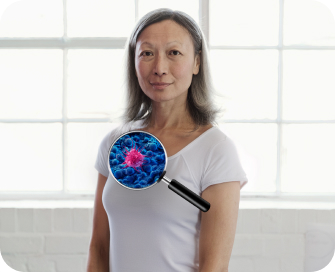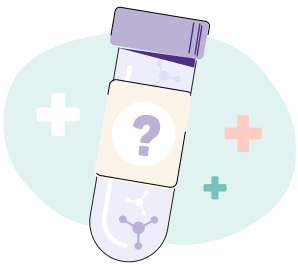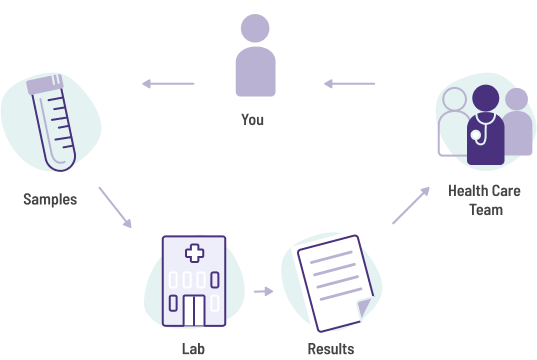
Importance of biomarker testing
Help make important treatment decisions with your doctor by understanding the role of cancer biomarker testing.
Can testing for cancer biomarkers be important?
Cancer biomarker testing may be used to create a treatment plan based on your test results so that you can receive treatments that may be more likely to help you.
Cancer biomarker testing can be an important step in your treatment plan. Cancer biomarkers are substances, like genes or proteins, that can be found in your tissue, blood, or saliva (spit). They can help reveal important details about your cancer. You can think of biomarkers as “a clue inside you” that your doctor can look for and use to learn more about your cancer and how to treat it.

There are many ways cancer biomarker testing can help you and your doctor:
Diagnosis
Cancer biomarkers can be used to help define what kind of cancer you may have
Treatment
Cancer biomarkers may help doctors identify treatments that may be more likely to work for your type of cancer and help you get the most appropriate treatment for you
Monitoring
Cancer biomarkers may help your doctor better understand how well your cancer treatment is working, or look for possible signs of cancer returning
When to ask about biomarkers
Cancer biomarker testing may be part of a cancer care plan and affect treatment choice. It’s important to ask your doctor about cancer biomarkers early in your cancer journey, but you may ask at any time.

Care team conversations
Use the below questions to help you have an informed conversation with your doctor about the appropriate treatment for your specific cancer:
- Have you considered any biomarker testing?
- How could this biomarker test affect my treatment plan?
- Can biomarkers that affect my risk of cancer be passed from me to my children?
- Will I need to be retested for biomarkers?
- When will my doctor and I be able to discuss my biomarker testing results?
Remember, you are an important member of the team. If you have any questions or concerns about tests or results, be sure to talk about them with your doctor or other members of your care team.
If you have been diagnosed with cancer, ask your doctor about any recommended biomarker testing.
Biomarkers are the “clue inside you” that may help you and your doctor make better informed treatment decisions for you.
What type of biomarkers could I be tested for?
There are 2 types of biomarkers that can be tested for—acquired cancer biomarkers and inherited cancer biomarkers.
- Acquired cancer biomarkers are genes, proteins, or other substances that you have developed over your lifetime that may affect cancer cells or other cells in your body.
If you’ve already been diagnosed with cancer, testing for acquired biomarkers can help your doctor when recommending a treatment for you. - Inherited cancer biomarkers are genetic changes you may have been born with. These kinds of biomarkers can run in families, meaning there is a possibility they can be passed down from parents to children.
Testing for inherited biomarkers may help your doctor know if you are more likely to get certain kinds of cancers at some point in your life.

What are the types of biomarker tests?
Doctors use different tests to find and measure cancer biomarkers. The cancer biomarker test(s) your doctor chooses will depend on the type of cancer you have and what your doctor believes is most appropriate for your cancer.
Even if you have received cancer biomarker testing at initial diagnosis, your doctor may recommend a second cancer biomarker test. These results may be able to provide new information for treatment planning.
The most common tests for cancer biomarkers are:
- A biopsy, in which a doctor removes a tissue sample from your tumor
- A blood test, in which a sample of your blood is collected
- A saliva test, in which a sample of your saliva is collected
- A urine test, in which a sample of your urine is collected (this may be used for certain cancers, such as bladder cancer)
When will my doctor and I receive my cancer biomarker test results?
Your cancer biomarker test results may help inform your treatment plan. It may take a few weeks before your results are available, but your doctor can give you a better idea of how long it will take. Here is what to expect with the cancer biomarker testing process:
- Your tissue, blood, saliva, or urine samples will be sent to a lab
- At the lab, a doctor called a pathologist will study your samples to find the specific cancer biomarkers you might have
- The lab will send the results back to your doctor. It can take 2 weeks or more for your doctor to get the results. Be sure to follow up with your health care team for the results if you haven’t heard by then
- Your doctor will talk about the results with you and explain how they may help to make treatment decisions

Where can I find more cancer support?
Access resources that may help you during cancer treatment, including how to find financial support, local childcare, transportation services, and other important resources.
US-KEY-08153 09/24




